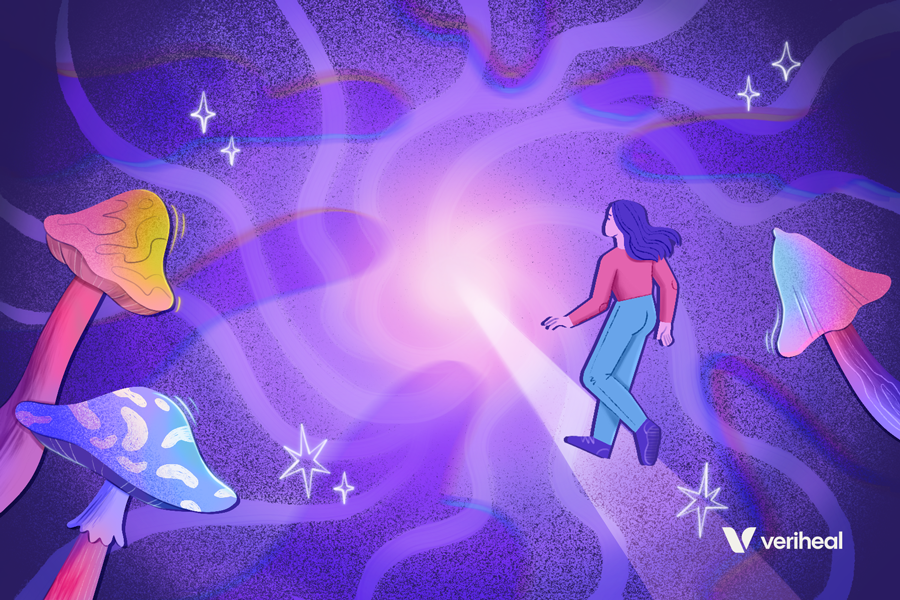“Thou know’st ’tis common; all that lives must die, Passing through nature to eternity.” – Hamlet, Act I, Scene II, Line 75
Like a beautiful song or a thrilling carnival ride, life also must come to an end. It is normal to feel sadness or fear about dying, and we all occasionally experience feelings of existential dread. There are numerous aspects of dying that people may fear: the unknowability of non-existence, being forgotten, regretting our choices, feeling powerless, or losing someone important to us. Although we cannot escape or cure death, medical trials and data analyses provide evidence that the therapeutic administration of psychedelics, such as psilocybin, can potentially ameliorate the distress we feel about confronting mortality.
Treating Death-Related Distress in Cancer Patients
Psilocybin is a psychoactive chemical that is naturally present in numerous species of fungi, often referred to as “magic mushrooms.” For thousands of years, these mushrooms have been used to alter consciousness, promote healing, and conduct certain religious or spiritual ceremonies (1)(2). In the present day, psilocybin use continues both in cultural ceremonies and in scientific laboratories where research on the psychedelic substance is currently expanding.
Researchers at Johns Hopkins University Medical School investigated the potential benefits of therapeutic psilocybin treatment for cancer patients experiencing depression and anxiety about death. Patients with life-threatening cancers were given either a negligibly small placebo-level dose or a therapeutic high dose of psilocybin. Patients’ moods, behaviors, and quality of life were then evaluated using clinician observations and self-assessment testimony. The researchers discovered that “…a single dose of psilocybin produced substantial and enduring decreases in depressed mood and anxiety along with increases in quality of life and decreases in death anxiety in patients with a life-threatening cancer diagnosis.” (3)
After the therapeutic administration of psilocybin, participants from the high-dose trial produced significantly greater ratings of positive attitudes about life, self, mood, social affairs, and spirituality. Compared to low-dose participant responses, the high-dose responses indicated feelings of greater personal meaning, optimism, life satisfaction, death acceptance, and increased well-being. According to the follow-up responses, these effects persisted for at least six months after receiving therapy.
Apply For Your Medical Marijuana Card Today
-
Veriheal has satisfied hundreds of thousands of patients nationwide - Get approved or your money back
- Appointments available on-demand
- Customer support available 24/7
Near-Death Experiences and Psychedelics Change Our Attitudes About Dying
Because people who have had near-death experiences tend to present less death anxiety (4) relative to those who have not had near-death experiences, we can better understand how to diminish death-related distress by examining the features of these experiences that potentially contribute to reducing negative emotions regarding mortality.
Research suggests that both near-death experiences and experiences with psychedelic drugs decrease fear of death. A detailed analysis compared the changes in death attitudes for survey participants having had near-death experiences and individuals with experience using psychedelics (not just psilocybin, but also DMT, ayahuasca, and LSD). The findings indicate that a large majority of participants in both groups—88% of the Non-Drug Group and 89% of the Psychedelics Group—reported that their experience resulted in a decrease in their fear of death, as well as positive changes in their curiosity and attitudes toward death, including their own death.
Possible Neurochemical Explanations
It has been hypothesized that psilocin’s ability to alter brain network connectivity promotes “mystical” psychedelic experiences associated with positive, often long-term, changes in death-related attitudes.
- When consumed, psilocybin is converted to its active metabolite, psilocin, which is similar in molecular structure to serotonin.
- Psilocin binds to serotonin receptors, which stimulates hyperactivity in the prefrontal cortex promoting the “mystical-like” hallucinatory experience that induces antidepressant and anti-anxiety effects.
- Psilocin also temporarily disrupts connections between certain areas of the brain while increasing connectivity in other areas.
- During this temporary disruption of usual brain signaling activity, the brain can activate novel connections, which produce an altered state of consciousness with characteristic experiences of “ego dissolution,” “oneness,” and other spiritual encounters (4).
The Inevitable Conclusion
Research on the therapeutic application of psychedelics is still emerging, but the current findings provide interesting evidence about the relationship between psychedelic experiences and existential anxiety. Because living is in part defined by its being the negation of non-living, death seems to be a ubiquitous feature of life itself, and it is only natural to experience some fear of the unknowable. Psilocybin is one psychedelic that has produced encouraging findings. As research progresses, perhaps we will learn more about how we can more confidently confront the inevitable and unknown using the magic of mushrooms.
1. Whitely, Aliya. (2021). The Secret Life of Fungi. Pegasus Books, NYC and London. 144-146.
2. Whinkin, E., Watters, C., Jaffe, A., Aggarwal, S. (2023). “Psilocybin in Palliative Care: An Update.” Current Geriatrics Reports. https://doi.org/10.1007/s13670-023-00383-7
3. Griffiths, R.R., Johnson, M. W., Carducci, M.A., Umbricht, A., Richards W.A., Richards, B.D., Cosimano, M.P., Klinedinst, M.A. (2016). “Psilocybin produces substantial and sustained decreases in depression and anxiety in patients with life-threatening cancer: A randomized double-blind trial.” Journal of Psychopharmacology, vol. 30(12), pp. 1181-1197. https://www.ncbi.nlm.nih.gov/pmc/articles/PMC5367557/
4. Sweeney, M.M., Nayak, S., Hurwitz, E.S., Mitchell, L.N., Swift T.C., Griffiths, R.R. (2022). “Comparison of psychedelic and near-death or other non-ordinary experiences in changing attitudes about death and dying.” PLOS ONE, 17(8). https://doi.org/10.1371/journal.pone.0271926


